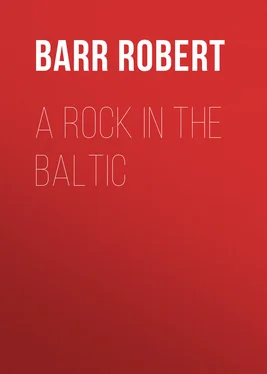Robert Barr - A Rock in the Baltic
Здесь есть возможность читать онлайн «Robert Barr - A Rock in the Baltic» — ознакомительный отрывок электронной книги совершенно бесплатно, а после прочтения отрывка купить полную версию. В некоторых случаях можно слушать аудио, скачать через торрент в формате fb2 и присутствует краткое содержание. Жанр: foreign_prose, foreign_antique, на английском языке. Описание произведения, (предисловие) а так же отзывы посетителей доступны на портале библиотеки ЛибКат.
- Название:A Rock in the Baltic
- Автор:
- Жанр:
- Год:неизвестен
- ISBN:нет данных
- Рейтинг книги:5 / 5. Голосов: 1
-
Избранное:Добавить в избранное
- Отзывы:
-
Ваша оценка:
- 100
- 1
- 2
- 3
- 4
- 5
A Rock in the Baltic: краткое содержание, описание и аннотация
Предлагаем к чтению аннотацию, описание, краткое содержание или предисловие (зависит от того, что написал сам автор книги «A Rock in the Baltic»). Если вы не нашли необходимую информацию о книге — напишите в комментариях, мы постараемся отыскать её.
A Rock in the Baltic — читать онлайн ознакомительный отрывок
Ниже представлен текст книги, разбитый по страницам. Система сохранения места последней прочитанной страницы, позволяет с удобством читать онлайн бесплатно книгу «A Rock in the Baltic», без необходимости каждый раз заново искать на чём Вы остановились. Поставьте закладку, и сможете в любой момент перейти на страницу, на которой закончили чтение.
Интервал:
Закладка:
Dorothy looked up at her impatient friend, and a radiant cheerfulness chased away the gathering shadows from her face.
“Well, once upon a time I lived very happily with my father in a little rectory in a little town near the Hudson River. His family had been ruined by the war, and when the plantation was sold, or allowed to go derelict, whatever money came from it went to his elder and only brother. My father was a dreamy scholar and not a business man as his brother seems to have been. My mother had died when I was a child; I do not remember her. My father was the kindest and most patient of men, and all I know he taught me. We were very poor, and I undertook the duties of housekeeper, which I performed as well as I was able, constantly learning by my failures. But my father was so indifferent to material comforts that there were never any reproaches. He taught me all that I know in the way of what you might call accomplishments, and they were of a strangely varied order—a smattering of Latin and Greek, a good deal of French, history, literature, and even dancing, as well as music, for he was an excellent musician. Our meager income ceased with my father’s life, and I had to choose what I should do to earn my board and keep, like Orphant Annie, in Whitcomb Riley’s poem. There appeared to be three avenues open to me. I could be a governess, domestic servant, or dressmaker. I had already earned something at the latter occupation, and I thought if I could set up in business for myself, there was a greater chance of gaining an independence along that line than either as a governess or servant. But to do this I needed at least a little capital.
“Although there had been no communication between the two brothers for many years, I had my uncle’s address, and I wrote acquainting him with the fact of my father’s death, and asking for some assistance to set up in business for myself, promising to repay the amount advanced with interest as soon as I was able, for although my father had never said anything against his elder brother, I somehow had divined, rather than knew, that he was a hard man, and his answering letter gave proof of that, for it contained no expression of regret for his brother’s death. My uncle declined to make the advance I asked for, saying that many years before he had given my father two hundred dollars which had never been repaid. I was thus compelled, for the time at least, to give up my plan for opening a dressmaking establishment, even on the smallest scale, and was obliged to take a situation similar to that which I hold here. In three years I was able to save the two hundred dollars, which I sent to my uncle, and promised to remit the interest if he would tell me the age of the debt. He replied giving the information, and enclosing a receipt for the principal, with a very correct mathematical statement of the amount of interest if compounded annually, as was his legal right, but expressing his readiness to accept simple interest, and give me a receipt in full.”
“The brute!” ejaculated Katherine, which remark brought upon her a mild rebuke from her mother on intemperance of language.
“Well, go on,” said Katherine, unabashed.
“I merely mention this detail,” continued Dorothy, “as an object lesson in honesty. Never before since the world began was there such a case of casting bread upon the waters as was my sending the two hundred dollars. My uncle appears to have been a most methodical man. He filed away my letter which contained the money, also a typewritten copy of his reply, and when he died, it was these documents which turned the attention of the legal arm who acted for him to myself, for my uncle had left no will. The Californian firm communicated with lawyers in New York, and they began a series of very cautious inquiries, which at last resulted, after I had furnished certain proofs asked for, in my being declared heiress to my uncle’s estate.”
“And how much did you get? How much did you get?” demanded Katherine.
“I asked the lawyers from New York to deposit ten thousand dollars for me in the Sixth National Bank of this town, and they did so. It was to draw a little check against that deposit, and thus learn if it was real, that I went out to-day.”
“Ten thousand dollars,” murmured Katherine, in accents of deep disappointment. “Is that all?”
“Isn’t that enough?” asked Dorothy, with a twinkle in her eyes.
“No, you deserve ten times as much, and I’m not going to New York or Boston at your expense to buy new dresses. Not likely! I will attend the ball in my calico.”
Dorothy laughed quietly, and drew from the little satchel she wore at her side a letter, which she handed to Katherine.
“It’s private and confidential,” she warned her friend.
“Oh, I won’t tell any one,” said Katherine, unfolding it. She read eagerly half-way down the page, then sprang to her feet on the top of the table, screaming:
“Fifteen million dollars! Fifteen million dollars!” and, swinging her arms back and forth like an athlete about to leap, sprang to the floor, nearly upsetting the little table, tray and all, as she embraced Dorothy Amhurst.
“Fifteen millions! That’s something like! Why, mother, do you realize that we have under our roof one of the richest young women in the world? Don’t you see that the rest of this conference must take place in our drawing-room under the most solemn auspices? The idea of our keeping such an heiress in the attic!”
“I believe,” said Sabina, slowly and coldly, “that Mr. Rockefeller’s income is—”
“Oh, blow Mr. Rockefeller and his income!” cried the indignant younger sister.
“Katherine!” pleaded the mother tearfully.
CHAPTER III —ON DECK
THROUGHOUT the long summer day a gentle excitement had fluttered the hearts of those ladies, young, or not so young, who had received invitations to the ball on board the “Consternation” that night. The last touches were given to creations on which had been spent skill, taste, and money. Our three young women, being most tastefully and fashionably attired, were in high spirits, which state of feeling was exhibited according to the nature of each; Sabina rather stately in her exaltation; Dorothy quiet and demure; while Katherine, despite her mother’s supplications, would not be kept quiet, but swung her graceful gown this way and that, practising the slide of a waltz, and quoting W. R. Gilbert, as was her custom. She glided over the floor in rhythm with her chant.
“When I first put this uniform on
I said, as I looked in the glass,
‘It’s one to a million
That any civilian
My figure and form will surpass.’”
Meanwhile, in a room downstairs that good-natured veteran Captain Kempt was telling the latest stories to his future son-in-law, a young officer of the American Navy, who awaited, with dutiful impatience, the advent of the serene Sabina. When at last the ladies came down the party set out through the gathering darkness of this heavenly summer night for the private pier from which they were privileged, because of Captain Kempt’s official standing, to voyage to the cruiser on the little revenue cutter “Whip-poor-will,” which was later on to convey the Secretary of the Navy and his entourage across the same intervening waters. Just before they reached the pier their steps were arrested by the boom of a cannon, followed instantly by the sudden apparition of the “Consternation” picked out in electric light; masts, funnel and hull all outlined by incandescent stars.
“How beautiful!” cried Sabina, whose young man stood beside her. “It is as if a gigantic racket, all of one color, had burst, and hung suspended there like the planets of heaven.”
“It reminds me,” whispered Katherine to Dorothy, “of an overgrown pop-corn ball,” at which remark the two girls were frivolous enough to laugh.
Читать дальшеИнтервал:
Закладка:
Похожие книги на «A Rock in the Baltic»
Представляем Вашему вниманию похожие книги на «A Rock in the Baltic» списком для выбора. Мы отобрали схожую по названию и смыслу литературу в надежде предоставить читателям больше вариантов отыскать новые, интересные, ещё непрочитанные произведения.
Обсуждение, отзывы о книге «A Rock in the Baltic» и просто собственные мнения читателей. Оставьте ваши комментарии, напишите, что Вы думаете о произведении, его смысле или главных героях. Укажите что конкретно понравилось, а что нет, и почему Вы так считаете.












